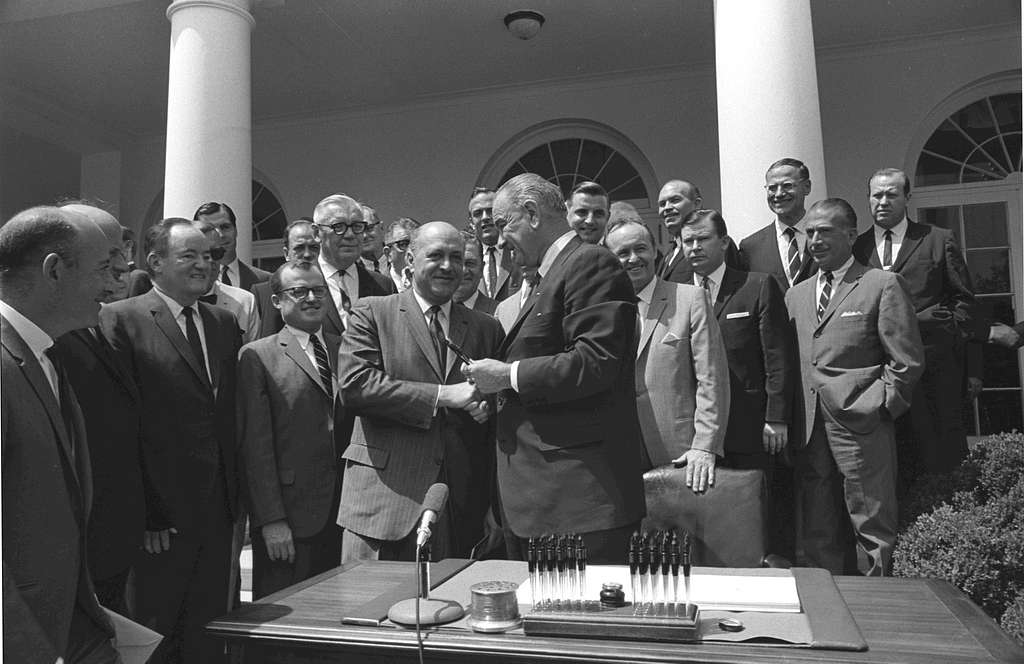A Phil Hall Op-Ed: When President Lyndon B. Johnson signed the Housing and Urban Development Act of 1965, he called it “the single most important breakthrough” in federal housing policy since the 1920s. In concept, the legislation’s key focus – the creation of the Department of Housing and Urban Development (HUD) – was designed to concentrate and expand federal housing programs into a single, cabinet-level agency while also addressing the socioeconomic deterioration impacting too many urban centers.
Today, however, things are a lot different. While President Johnson and his successors Richard Nixon, Gerald Ford and Jimmy Carter took HUD seriously and prioritized its mission as part of their respective administration’s domestic policies, subsequent administrations placed a much lower degree of importance on HUD and the impact of the men and women who were tasked with running it. Indeed, for too long it seemed like the wrong people were running HUD while the department shifted its focus to issues that did not deserve priority treatment.
At the beginning of the existence, HUD was seen as a highly important department. President Lyndon B. Johnson used the department to break a historic barrier in 1966 when Robert C. Weaver became both the first HUD secretary and the first African American cabinet secretary. In the years that followed, the role of HUD secretary was filled by many prominent and highly respected figures – over the years, the likes of George Romney, Carla Hills, Patricia Roberts Harris, Moon Landrieu and Jack Kemp were at the helm.
But during the 1980s, the value of HUD within the Executive Branch began to diminish. Ronald Reagan’s HUD secretary, Samuel Pierce, had so little contact and influence with the White House that Reagan didn’t recognize him during a Washington function. Jack Kemp repeatedly and openly clashed with George H.W. Bush and his economic advisors who did not support his initiatives related to public housing and business incentives within urban centers. Later administrations downplayed the HUD role to the point that George W. Bush’s HUD secretary in 2008, Steve Preston, was conspicuously absent from the administration’s response to the housing-fueled Great Recession – Treasury Secretary Henry Paulson and Federal Reserve Chairman Ben Bernanke took the lead at that time.
Other HUD secretaries were hired strictly to create a national springboard for rising political stars – this may explain why Andrew Cuomo, Mel Martinez and Julian Castro were put in charge of a department where they had no previous experience. More recent choices for the HUD spot were even more baffling – Donald Trump gave us Dr. Ben Carson, a retired neurosurgeon with no housing policy or government experience, while Joe Biden put Ohio Congresswoman Marcia Fudge in the role after corporate agriculture executives balked at her publicized desire to use the Department of Agriculture for addressing food insecurity and farmland conservation.
Fudge initially rejected at being considered for HUD’s leadership, telling Politico after the 2020 election, “You know, it’s always ‘we want to put the Black person in Labor or HUD.’” She wasn’t wrong – more than a few people on X are now sourly predicting that the second Trump administration will place its sole Black cabinet member at HUD, a repeat of the first Trump term.
Furthermore, HUD has generated more than a few hiccups over the years that called its effectiveness into question. In June 1993, HUD Secretary Henry Cisneros admitted that his department “has in many cases exacerbated the declining quality of life in America.” From 1994 through 2007, the US Government Accountability Office (GAO) kept the department on its “high-risk” list due to program mismanagement. During the Biden years, HUD appeared to be obsessed with addressing climate change while paying little attention to the evaporation of affordable housing, and the department’s responses to the Maui wildfires and Hurricanes Helene and Milton were woefully unsatisfactory.
As of this writing, President-elect Trump has yet to name the next HUD secretary. But that person has a huge responsibility ahead of them – they must either create a new sense of urgency in being responsible for addressing the serious challenges of its often-ignored mission. Without someone in charge who is genuinely a leader, HUD may soon have to answer to another agency – the new Department of Government Efficiency, with co-captains Elon Musk and Vivek Ramaswamy ready to cut away anything they see as wasteful and irrelevant.
Phil Hall is editor of Weekly Real Estate News. He can be reached at [email protected].
Photo: President Lyndon B. Johnson shaking hands with Robert C. Weaver at the ceremonial signing of the Housing and Development Act of 1965. Photo courtesy of the LBJ Library.


















And yet, here we still are. Housing is a big issue and these large LLC corporations are buying homes and now charging exuberant prices that people cannot afford.
Subdivisions with an active HOA (homeowners association) have been fighting back to keep the number of rentals to a minimum due to the large private equity, stock companies and LLCs that have bought voraciously into their neighborhoods. Like condos & PUD developments the number of rentals have been mostly capped at around 10%-15% or the total number of single family housing units in their subdivision. Other HOAs have made it mandatory that before a house becomes a rental that it has to be owner-occupied for 3 consecutive years. That is the case in my subdivision. Ours was a defensive move due to the “big boys” cobbling up homes at prices that were insanely high when compared to list prices. Their deep pockets crowded out many 1st time buyers. I was a FHA inspector for 10 years and a full time appraiser for 34 years. The government thru HUD and the VA and the help of Congress and the President could enact new programs that gives the individual (non-corporate) a small down payment and some closing costs. The $25k government down payment that Kamala Harris pushed during the campaign is too aggressive and costly but some kind of “new” assistance could help 1st time buyers especially those with strapping college education student loans that many have to pay. Like the NAR and other housing advocates just a little extra buyer help from HUD & VA could really help make house buying sooner rather than later a reality versus a dream for some Americans.
So why did investors begin becoming landlords? I saw it happening in 2009. Buying up huge blocks of non performing assets from banks and selling off that which they didn’t want and leasing the rest.
It was safer than stocks and the interest rate was low enough that fixed income securities were giving nothing for returns.
So in 2018, interest rates were lowered, sparking more interest in buying up rentals. Enter 2020, covid hit and they slashed the interest rate and investors were either in stocks or real estate. Both shot up like rockets.
Lower interest rates drastically again and watch us become a rental society where only the wealthy can afford homes.